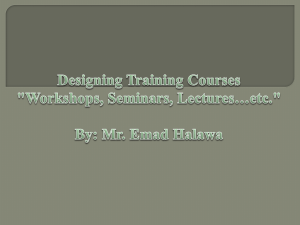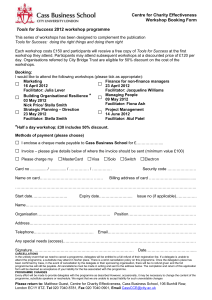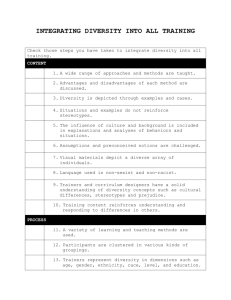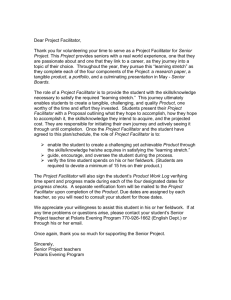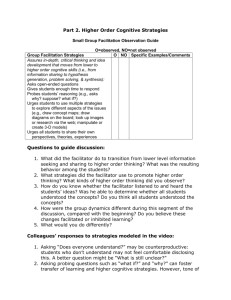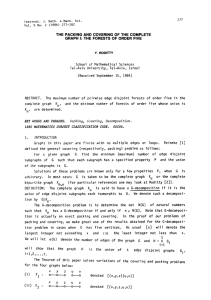Value Management - Constructing Excellence
advertisement
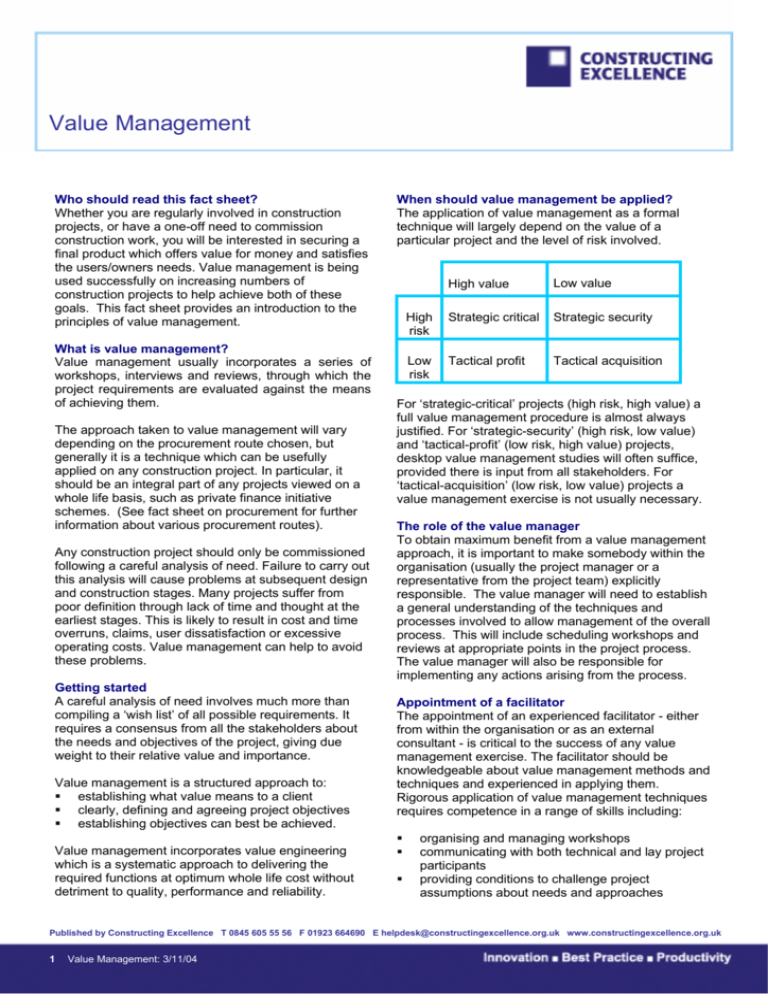
Value Management Who should read this fact sheet? Whether you are regularly involved in construction projects, or have a one-off need to commission construction work, you will be interested in securing a final product which offers value for money and satisfies the users/owners needs. Value management is being used successfully on increasing numbers of construction projects to help achieve both of these goals. This fact sheet provides an introduction to the principles of value management. What is value management? Value management usually incorporates a series of workshops, interviews and reviews, through which the project requirements are evaluated against the means of achieving them. The approach taken to value management will vary depending on the procurement route chosen, but generally it is a technique which can be usefully applied on any construction project. In particular, it should be an integral part of any projects viewed on a whole life basis, such as private finance initiative schemes. (See fact sheet on procurement for further information about various procurement routes). Any construction project should only be commissioned following a careful analysis of need. Failure to carry out this analysis will cause problems at subsequent design and construction stages. Many projects suffer from poor definition through lack of time and thought at the earliest stages. This is likely to result in cost and time overruns, claims, user dissatisfaction or excessive operating costs. Value management can help to avoid these problems. Getting started A careful analysis of need involves much more than compiling a ‘wish list’ of all possible requirements. It requires a consensus from all the stakeholders about the needs and objectives of the project, giving due weight to their relative value and importance. Value management is a structured approach to: establishing what value means to a client clearly, defining and agreeing project objectives establishing objectives can best be achieved. Value management incorporates value engineering which is a systematic approach to delivering the required functions at optimum whole life cost without detriment to quality, performance and reliability. When should value management be applied? The application of value management as a formal technique will largely depend on the value of a particular project and the level of risk involved. High value Low value High risk Strategic critical Strategic security Low risk Tactical profit Tactical acquisition For ‘strategic-critical’ projects (high risk, high value) a full value management procedure is almost always justified. For ‘strategic-security’ (high risk, low value) and ‘tactical-profit’ (low risk, high value) projects, desktop value management studies will often suffice, provided there is input from all stakeholders. For ‘tactical-acquisition’ (low risk, low value) projects a value management exercise is not usually necessary. The role of the value manager To obtain maximum benefit from a value management approach, it is important to make somebody within the organisation (usually the project manager or a representative from the project team) explicitly responsible. The value manager will need to establish a general understanding of the techniques and processes involved to allow management of the overall process. This will include scheduling workshops and reviews at appropriate points in the project process. The value manager will also be responsible for implementing any actions arising from the process. Appointment of a facilitator The appointment of an experienced facilitator - either from within the organisation or as an external consultant - is critical to the success of any value management exercise. The facilitator should be knowledgeable about value management methods and techniques and experienced in applying them. Rigorous application of value management techniques requires competence in a range of skills including: organising and managing workshops communicating with both technical and lay project participants providing conditions to challenge project assumptions about needs and approaches Published by Constructing Excellence T 0845 605 55 56 F 01923 664690 E helpdesk@constructingexcellence.org.uk www.constructingexcellence.org.uk 1 Value Management: 3/11/04 Value Management motivating project participants towards achieving objectives the ability to analyse complex problems providing conditions to seek innovative solutions to project needs the ability to tease out issues from a project background leadership and authority. For The decision to appoint either an internal or an external facilitator should be made taking a number of considerations into account. Both options have advantages and drawbacks. See table opposite for examples. In certain cases, the roles of value manager and facilitator may be carried out by the same individual, provided he or she is suitably trained and experienced. Case Study: Value Management in London Underground The South Wimbledon Refurbishment Project was part of a programme of major improvements to 10 stations at the Northern Line’s southern end. The aim of the project was to enhance the passenger environment and improve operational functionality. The project’s tactic was to incorporate a number of asset improvement works on the station in a single time slot, minimising future disturbance. Reductions in the availability of capital funds made it essential that savings were made or the implementation of the project would have been at risk. As a result of an intensive value management workshop the project developed an implementation plan that achieves a considerable number of the originally identified key benefits. At the same time it reduced the funds required by almost half. Against An internal facilitator • familiarity with the project can help the team achieve a deeper understanding of the project • can contribute towards effective team building • may not be able to appraise their own work critically • may not be able to introduce fresh and new ideas • are more likely to confirm that their original approach is the most effective one • • • • • • • An external facilitator fresh ideas are generated the design can be critically appraised without having to defend existing ideas or approaches can bring experience from other more diverse projects and organisations potential conflict between external and internal parties the project team may be unwilling to implement recommendatio ns made externally the ownership, and liability for design ideas may be unclear may experience a more difficult learning curve Published by Constructing Excellence T 0845 605 55 56 F 01923 664690 E helpdesk@constructingexcellence.org.uk www.constructingexcellence.org.uk 2 Value Management: 3/11/04 Value Management Case Study: Value Management in Pizza Hut UK In early 1997 Pizza Hut was anticipating a programme of 25 refit projects (Pizza Delivery Units) at an estimated/budget value of £145,000 each, amounting to a programme value of over £3.5 million. In order to review the projects before going on site, a series of three half-day value management workshops was convened comprising client representatives (Area Manager and Property Manager) and the consultants (Designer, QS and Services Engineer). The workshops were facilitated by an experience value management facilitator from outside the project team. The three workshops followed a traditional format of information exchange, functional analysis, brainstorming of alternative solutions, evaluation of preferred alternatives, acceptance and implementation. As a result of nine hours of workshop and a similar amount of work outside the workshops by members of the team a total of £14,000 per project was saved, equivalent to £350,000 capital cost on the whole programme. In some areas standards were actually raised, and longer term maintenance was reduced. A shorter contract period was also established and shorter delivery times for certain long lead items. The total cost of the value management exercise was estimated at less than £10,000, giving a return of 35:1 on the investment. For more detailed guidance Value Management in Construction: A Client’s Guide, CIRIA Special Publication 129. Construction Industry Research and Information Association. This guide provides a framework for the systematic application of value management for different clients and types of construction project. It outlines how to deal with project which are difficult to define because of their nature and the range of ‘clients’ involved, how to deal with projects which are easier to define where there is agreement over the main priorities and objectives, and how clients who build regularly can implement value management in their organisation. Value management: a series of four documents. BRE Bookshop. Value Management is a creative, problem-solving process that uses a methodical approach to include the necessary parties and, working together, achieve the best solutions for value from construction. Titles in the series: Value from construction, The value workshop, Value for social housing and The F.A.S.T. approach. www.brebookshop.com Creating Value in Engineering. ICE Design and Practice Guide. Published for the Institute of Civil Engineers by Thomas Telford Publishing. This design and practice guide is primarily for those who are entering or have recently entered the civil engineering professions. It can also be used by owners, designers constructors and others involved in the built environment. Rather than being prescriptive, it sets out some of the key approaches and techniques which may be used to improve value. Value Engineering of Building Services. Application guide 15/96. BSRIA. This guide explains the basic concepts underlying the techniques of value analysis including value management and in particular value engineering. It demonstrates how these techniques might influence the design of building services systems and is intended for use by building services designers who wish to offer clients a value management/engineering service, or to prepare them for a value analysis process organised by a third party. www.bsria.co.uk Achieving Excellence Guide 4: Risk and value management, Office of Government Commerce. This guide explains how risk and value are managed. These processes are fundamental to the successful delivery of projects and should be used throughout the life of the project. The guide summarises the key principles of risk and value management in the context of construction projects and describes the practical steps that need to be taken over the project lifecycle. www.ogc.gov.uk The Institute of Value Management (IVM). The professional association exclusively committed to Value Management. The IVM is responsible for implementing the European Certification and Training System within the UK. The Professionals in Value Management (PVM) qualification signals the required competence to lead value studies in a variety of environments and contribute to the development of VM strategies. For a list of PVM's please see the IVM web site: www.ivm.org.uk. Published by Constructing Excellence T 0845 605 55 56 F 01923 664690 E helpdesk@constructingexcellence.org.uk www.constructingexcellence.org.uk 3 Value Management: 3/11/04
